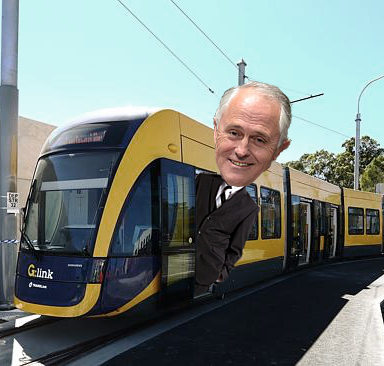Turnbull shows hint of transport u-turn
 Prime Minister Malcolm Turnbull says the Gold Coast Light Rail network is a vital piece of infrastructure for Queensland, and that the Federal Government will back a proposed expansion.
Prime Minister Malcolm Turnbull says the Gold Coast Light Rail network is a vital piece of infrastructure for Queensland, and that the Federal Government will back a proposed expansion.
Mr Turnbull says the Commonwealth will put up $95 million towards the project, a small slice of the estimated $700 million total cost.
The new PM used his first official trip to Queensland to announce the funds that will help ensure stage two of the project is delivered ahead of the 2018 Commonwealth Games.
“It is limited to that amount - and no more,” Mr Turnbull said.
“It is very much a Queensland project so the construction risk is obviously with Queensland - that's why the grant is capped.”
The Gold Coast City Council has pledged $55 million for the project, leaving a bill of over half a billion dollars for the State Government.
Former prime minister Tony Abbott said there would be no federal funds for the project unless the Queensland Government sold some assets.
Federal Member for Moncrieff, Steven Ciobo, said just a few weeks ago that Queensland should lease public assets to fund the work.
Just over a week ago, he had changed his tune signs that Mr Turnbull would take a more pragmatic approach to infrastructure funding.
“We've got a new federal approach in terms of providing funding for urban public transport,” Mr Ciobo said.
“The new Prime Minister, Malcolm Turnbull, has made it clear to me, and I have spoken to him numerous times now in relation to this light rail project, that there is potential to look at it.”
Queensland Premier Annastacia Palasczcuk said she was thrilled that the project is rolling ahead.
“This 7.3 kilometre extension - the stage two of the light rail - is vital for the Commonwealth Games,” she said.
“Now with the Federal Government coming on board we now know the business case will be finalised by December 23 and it also means then that construction can start in April next year.”
Mr Turnbull said public transport infrastructure would be a critical part of future development in Australia's cities.
“Our cities are the crucibles of innovation, of enterprise - it's where so much of GDP is created and it's vital that they have the right infrastructure, whether it is telecommunications infrastructure or transport infrastructure like this,” he said.
“In the future we want to look at more innovative approaches.
“We want to look at arrangements where we can partner.”
Proponents say the project could generate over 1,000 jobs during its construction phase.
Three firms have been shortlisted to oversee the build, and a preferred contractor is expected to be appointed in early 2016.







 Print
Print